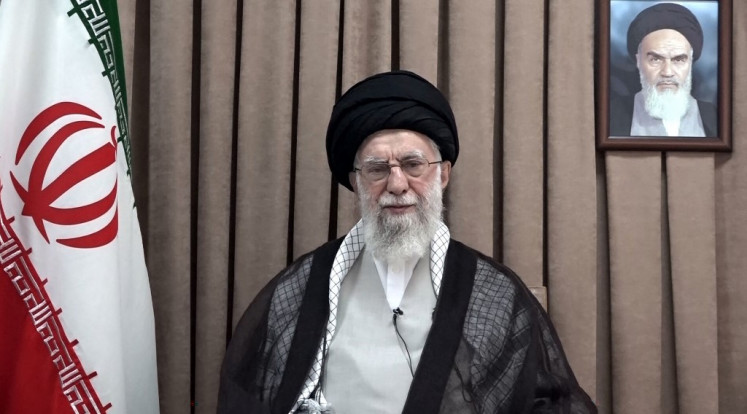Popular Reads
Top Results
Can't find what you're looking for?
View all search resultsPopular Reads
Top Results
Can't find what you're looking for?
View all search resultsData is key: Why education budget should focus on teacher development
Providing continuous professional development and supporting facilities can vastly improve education service delivery and learning outcomes in Indonesia, but data is the key.
Change text size
Gift Premium Articles
to Anyone

Indonesia is one of the biggest education spenders in the world if spending is measured as a share of total public expenditure, but not if spending is measured as a share of gross domestic product (World Bank, 2020).
In 2020, the country allocated 20 percent of public expenditure to the education sector for a total education budget of Rp 508 trillion (US$49 billion). This was then apportioned centrally, with a significant proportion given to local governments through special allocation funds.
On average, Indonesia spends over 80 percent of its education budget on teacher salaries, higher than most high-performing education systems across the globe. When comparing across regions, low-capacity local governments tend to spend the majority of their funds on salaries, significantly more than neighboring countries, yet with low returns in student learning outcomes.
Although this rational may be based on facts pointing to higher teacher salaries resulting in benefits such as happier teachers who were less likely to hold second jobs and who had less financial stress, studies show that it does not actually improve desired outcomes. Instead, we see a lack of robust data and information systems to adjust for more targeted support, which could cost the country trillions of rupiah that may otherwise be spent more effectively.
In light of the significant allocation of the education budget, paired with the low monitoring and accountability (support) mechanism that exist in Indonesia’s education space, this paper proposes that improved education monitoring mechanisms with a specific focus on the provisioning of continuous professional development (CPD) in low-capacity regions will be instrumental in improving learning outcomes. It seeks to outline potential steps that can be taken to provide further support for existing teachers in fulfilling their difficult tasks.
Fifteen years ago, Indonesia conducted a policy experiment to increase teacher salaries. In its first year, results showed increased satisfaction among teachers and improved welfare, but after the second year, problems like teacher absenteeism recurred and learning outcomes remained unchanged. Similar results were also seen across countries such as Pakistan, India and Kenya. Alternatively, many developing countries saw substantial gains in learning outcomes as a result of successful reforms that focused on the continuous provision of teacher professional development (PD). This was especially so if such support was paired with sufficient and publicly accessible nationwide mechanisms to oversee education service delivery and monitor budgets as well as learning outcomes.
A 2013 report found that total spending on teacher salaries had no significant correlation to learning outcomes, and some even showing a slightly negative slope, wherein data for Indonesia show a positive correlation between non-salary expenditures and [math] scores, as well as Indonesian language scores. In another report presenting the most cost-effective approaches to improve global learning, the “most effective interventions change how teachers teach”. That said, providing materials, ongoing training and monitoring was required in order to enable teachers to use the plans effectively.
Yet, a World Bank report showed that teacher training comprised just 1 percent of regional education expenditure in Indonesia, while payment of “teacher salaries and allowances” was 86 percent of total spending. More worthy of noting was that districts with the lowest capacity were seen to allocate the lowest budget to teacher training and PD compared to higher-capacity districts and their urban counterparts.
Understandably, budgetary reallocation may cause political stir and potential backlash from teachers unions, including on increasing oversight of teachers through additional monitoring mechanisms and examining the existing database to see where funds could be better reallocated, as well as the valid argument of needing to incentivize teachers in low-capacity districts. This proves the need to provide a better support mechanism for teachers.
With these shifts, along with the right implementing mechanisms, both teachers and the wider education system will benefit significantly from education budget reallocation, whereby teachers will be more readily equipped to support students in their learning.
However, in order to ensure the greatest effectiveness of budget reallocation and teacher PD provisioning, monitoring mechanisms need to be strengthened to better identify gaps and to target interventions.
While we know that regional governments are not prioritizing teacher training, the data showing exactly where and in what ways this is so is lacking. Is this due to access? Are there more pressing needs for budget expenditure and attention in other areas? What is the management system like, and are there ways to improve facilitation of service delivery? We simply do not know.
The same World Bank report on regional spending found that data availability was a significant constraint in a recent analysis of financial reports as regards district/city-level budgeting for education. Information was limited on the quantity and quality of school facilities and management processes, which in turn constrained their ability to fully unpack how spending is associated with delivering quality education and student learning outcomes. Such data is important to ensure that teachers and schools get the support they need from government and relevant service providers.
That said, Indonesia can invest much more in accurately overseeing these gaps in quality service delivery and focus more on targeted investment in teacher training. Better data systems could free more funding for reallocating through steps such as identifying "ghost teacher" salaries, assessing where budgets may be shifted, identifying schools and districts that need more resources and support, and targeting interventions and needs to better support the country’s teaching force through non-salary expenditures, particularly in low-capacity districts.
Time and again, the evidence points to the dire need to improve teacher capacity, provide CPD and support teachers in the work they do; to build their communities and enable them to teach effectively by providing them with sufficient support and capacity through training. To achieve this, we need to keep track of just how well districts are doing, and monitoring these resources so the districts that need it will be given the appropriate support to develop the next generation of Indonesians.
With the Education Ministry’s focus on equity in the 2021 plan to ensure that rural areas are sufficiently providing for student learning, this is a detrimental step that needs to be taken. Teachers will be able to see how they or their schools compare, and be at the forefront of demanding their rights and support in their work in building leaders of the next generation. Not only would such a system provide the oversight required, it would help mobilize education resources, improve spending efficiency and promote equitable resource use throughout the country.
That said, focusing on knowing where funds are being allocated, how schools are using the funding and specifically targeting vulnerable and high-need areas with more support, especially in teacher PD, may push Indonesia toward making greater, rapid strides in improving quality education and learning outcomes.
***
The writer is currently pursuing a master in international education policy at the Harvard Graduate School of Education.









